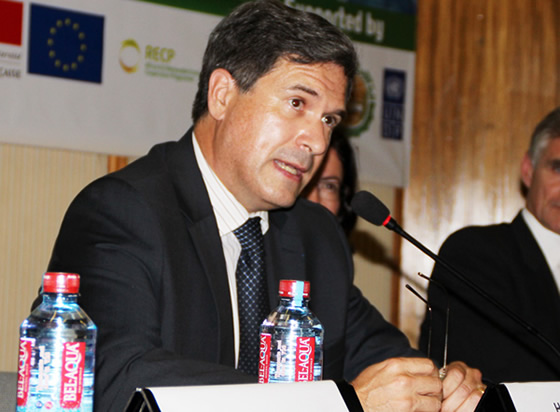
Mr Frédéric Clavier – French Ambassador to Ghana
The French Embassy in collaboration with Vice Chancellors in Ghana, are organising a two-day conference on higher education to enhance the cooperation between French and Ghanaian higher education institutions.
The annual conference, which is the third in the series, provides a platform where French and Ghanaian universities, institutions and networks could showcase the excellence of their education and the range of training opportunities available for students, employers and employees.
Mr Frederic Clavier, French Ambassador, at the opening on Monday, said the conference presents a unique occasion for exchange on the main challenges for training in engineering sciences from advanced technician to engineer, not only between universities, but also with private sector, to match the labour market needs, as well as contents of training programmes for a better employment.
He explained that the event consolidates the new dynamics of France’s relations in university cooperation since Ghana took up the decision to upgrade her higher education exchanges 2013.
He pledged France’s commitment to assisting mainly in the economic, tertiary education and research, adding that its support to the education sector considered across the range of primary-secondary-university education, is one of the 10 areas of concentration of their development policy.
“With the possibility of 330 million young people entering the labour market in sub-Saharan Africa by 2030, the issue of employability is at the heart of our actions,” he said.
He said the promotion of higher professional education and partnerships with economic actors in the training sense to middle management, drivers of sustainable and inclusive economic growth is therefore central to the academic cooperation strategy.
He said the French Ministry of Foreign Affairs and International Development has therefore initiated a proactive policy of technical assistance for the modernisation of universities, with the introduction of professional courses primarily oriented towards the most employable sectors.
Mr Clavier said the active partnership with the actors of the economic sector resulted in their involvement in curriculum development, the pooling of technical infrastructure of the financing of scholarships.
“We intend in the future to further strengthen this axis, particularly through the development of cooperation which values the provision of professional teaching, in line with areas of local employment,” he said.
He said the conference would discuss issues such as the training programmes and their suitability to the needs of the working world, that of professional and continuous training, that of student mobility and international exchanges which are still too moderate.
“We must pool our resources for the benefit of the best students, who once completed their training, will put all their skills to the test in public and private companies for development of the country and the benefit of their partnership between France and Ghana,” he said.
He said France and Ghana are privileged training platforms which must reinforce their presence and influence in Francophone and Anglophone Africa.
According to him; “Ghana has a quality and dynamic higher education system, and I am confidence about the future of our relations in the field of higher education, research and French language”.
Professor Jane Naana Opoku-Agyeman, Minister of Education, said she was encouraged by efforts that translate research into tangible outcomes for the socio-economic and industrial development of the country.
“We want knowledge that solves our problems. We want to make the study of science and engineering attractive to our youth, by facilitating its learning early on”, she said.
The Ministry, she said, has since last year trained 1,000 mathematics teachers to handle the lower levels of education where the sound foundation and interest ought to be taught in a way that justifies their status as compulsory.
She said science and mathematics should not be abstract concepts that exist in the minds of only the select few.
She said the collaborations hopefully would offer opportunities for French and Ghanaian universities participating, to develop competence-based curricula, build capacity in teaching and learning and quality enhancement and perhaps define common agreed study credits and assessment tools.
Source: GNA























